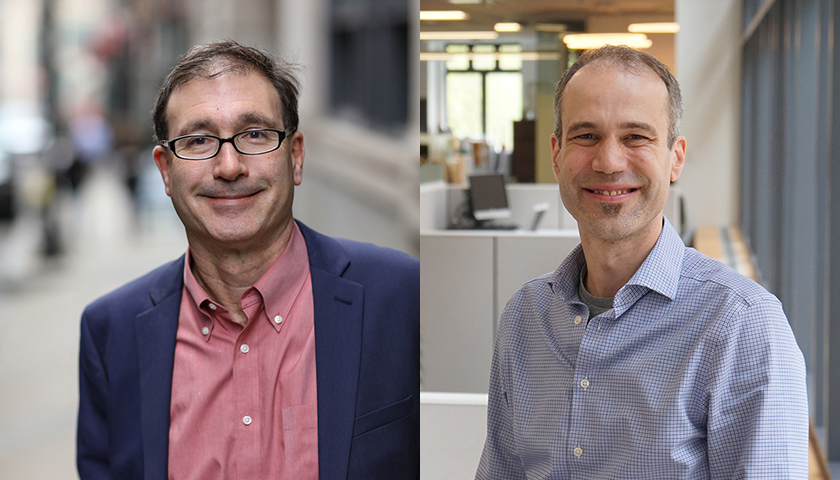Faculty Fulbrights to Study Media Tech Hubs & Cryptocurrency Governance

Two Sawyer Business School faculty members will be far from Boston when the new academic year begins. Strategy and International Business Professor Mark Lehrer and Finance Professor Bill Johnson will spend the year overseas as Fulbright Scholars. It’s the first time in the University’s history that two faculty have simultaneously participated in the widely recognized and prestigious international exchange program. Lehrer and Johnson took time out from hunting for apartments and finding schools for their children to sit down for a Q&A.
Q: Where are you each going and what will you be doing?
Mark Lehrer: I’ll spend the first half of 2020 shuttling back and forth between Potsdam/Berlin and Tel Aviv/Jerusalem to learn about building a high-tech media hub around film studios and other cultural institutions. Jerusalem, surprisingly, has succeeded magnificently in the construction of a media tech hub. Potsdam, in the Berlin region, has some of the country’s largest film studios and is hoping to succeed in building up a media tech hub in the way that Jerusalem has. I will be working with the University of Potsdam to help study and advise on the process as they develop innovative media technology solutions in entertainment and explore their relevance and potential for other industries.
Bill Johnson: I’ll be a visiting scholar in Vienna at Wirtschafts Universität Wien, teaching one class and doing research on corporate governance and cryptocurrency, specifically the corporate governance of initial coin offerings. The university just put in a new cryptocurrency research center, which is very cool.
Q: What will the Fulbright mean for your teaching and your research?
Mark Lehrer: Normally the question is about how research impacts teaching; for me, it’s the other way around. I teach an MBA course called “Understanding World-Class Clusters,” and teaching it impacted my research, to the point of applying for a Fulbright...and getting one.
Bill Johnson: As academics, we always want to do more research. So having time off to work on it is really helpful and will help me get further into what is a really new and exciting area. The interesting thing about cryptocurrency is that it’s possible the whole thing falls apart. But it could be huge. There are thousands of corporate governance researchers but only a few who focus on governance of cryptocurrency and issues like what responsibilities a company has when it comes to initial coin offerings. So I think the Fulbright will allow me to make a big impact for my career and for Suffolk in what could be a huge area.
Q: Apart from teaching and research, what are you most looking forward to?
Mark Lehrer: It’s quite a privilege to be selected as a Fulbright scholar. Since I’m working under the aegis of the State Department, an overriding priority for me is leaving a good impression on behalf of the United States.
Bill Johnson: There will be great opportunities to interact with faculty from other universities. The new cryptocurrency center is cross-disciplinary, so it will be interesting to work with really good people who are doing important research in other fields. Not only that, the EU is a really incredible place to do research because of its very different regulatory environment.
Q: What’s the importance for you of “getting away” from Suffolk University and doing something different like this?
Mark Lehrer: I would not say I am so much getting away from Suffolk as getting away from prior research. My last sabbatical was about German family firms, and while my research has been quite productive, with many articles on such firms, it really is time to embark on a new country: Israel.
Bill Johnson: This is what a sabbatical should be. You’ve been doing this great work but now you have an opportunity to enhance it and build something even bigger.



